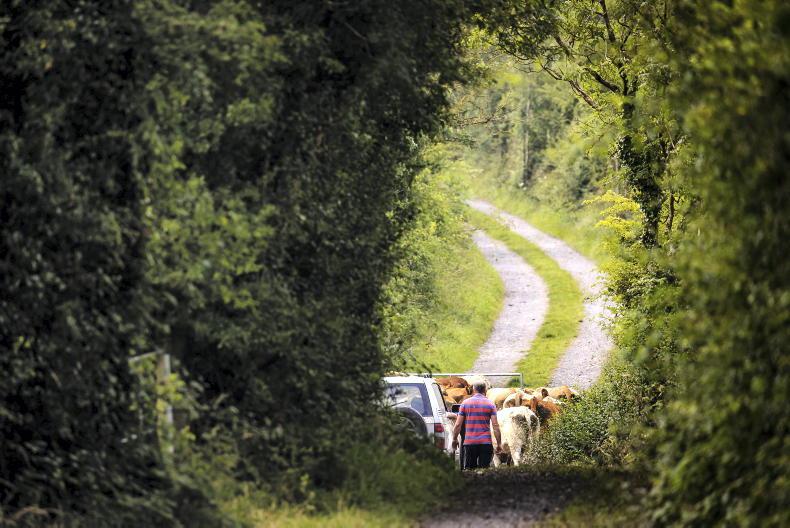Rights of Way (RoW) affect most farms across Ireland. The majority are not registered on a person’s title.
The law in relation to RoW changed in 2009, which required private rights of way to be registered on a person’s legal title by 30 November 2012. Following intense lobbying, this date was extended to 30 November 2021.
However, many landowners have still not had them registered. The ability to register after this date may prove a lot more difficult.
Get in touch
I intend to set out the consequences
of non-registration, the options
available and answer readers queries arising therefrom over the next few weeks so please do get in touch
ameehan@farmersjournal.ie
Consequences of non registration by 30 November 2021
If the RoW is not registered by 30 November 2021, a person must show continuous use of the RoW from 1 December 2009 to the date of registration. Consequently, it doesn’t matter that your right may have been enjoyed for a century before – it will be the previous 12 years that will be looked at.
This causes difficulties in several circumstances, including:
If the owner of the land over who’s RoW exists suffers from mental incapacity, such as Alzheimer’s or dementia for some of that 12 year period.If there was an interruption or break in continuity of use during that 12-year period.If the right is claimed in respect of any State land or foreshore which has 30-year and 60-year usage requirements.If the person who claims the RoW cannot prove the character of the use for that time.Under the law as it currently stands, if you register your RoW before 30 November 2021, you can rely on any continuous 20 year period of use of the RoW. However, if you register after 30 November 2021 you are limited to the 12 years use immediately before the application for registration or commencement of proceedings, if there is a dispute.
Benefits of registering right of way
In the absence of the registration of your right of way, the owner of the land over which the RoW exists could prevent or curtail your access.
Non-registration may also affect the marketability of the land, as the banks will not finance the purchase of that land unless the RoW has been registered.
The rules for claiming BPS, GLAS and the Organic Farming Scheme payments provides that there must be independent and suitable access for animals and/or machinery for the farming enterprise being conducted. The rules specify that independent access means access by public or private roadway – or by a defined RoW.
The law change is not limited to rights of way, it also affects rights of drainage, pipes, support, rights of light, rights to park and also profits such as turbary, grazing and fishing.
It can often arise on family farms that a sibling is given a site for a house, or perhaps inherits their parents house, and the pipework for the water and sewerage cross land adjoining the site owned by a brother or sister who inherited the farm.
If the brother or sister will not grant an easement by Deed, it will be necessary to rely on the rules of prescription (ie rights acquired by long use and subject to the change in law from 1 December 2021).
Having the rights registered could prevent the owner of the land on which the pipes are laid from interfering with the pipes and/or allow you access to the adjoining lands to repair the pipes if necessary.
In the next article I will set out options for farmers and landowners to best protect themselves in advance of the 1 December 2021 deadline.
Disclaimer: The information in this article is intended as a general guide only. While every care is taken to ensure accuracy of information contained in this article, Aisling Meehan Agricultural Solicitors does not accept responsibility for errors or omissions howsoever arising.
Rights of Way (RoW) affect most farms across Ireland. The majority are not registered on a person’s title.
The law in relation to RoW changed in 2009, which required private rights of way to be registered on a person’s legal title by 30 November 2012. Following intense lobbying, this date was extended to 30 November 2021.
However, many landowners have still not had them registered. The ability to register after this date may prove a lot more difficult.
Get in touch
I intend to set out the consequences
of non-registration, the options
available and answer readers queries arising therefrom over the next few weeks so please do get in touch
ameehan@farmersjournal.ie
Consequences of non registration by 30 November 2021
If the RoW is not registered by 30 November 2021, a person must show continuous use of the RoW from 1 December 2009 to the date of registration. Consequently, it doesn’t matter that your right may have been enjoyed for a century before – it will be the previous 12 years that will be looked at.
This causes difficulties in several circumstances, including:
If the owner of the land over who’s RoW exists suffers from mental incapacity, such as Alzheimer’s or dementia for some of that 12 year period.If there was an interruption or break in continuity of use during that 12-year period.If the right is claimed in respect of any State land or foreshore which has 30-year and 60-year usage requirements.If the person who claims the RoW cannot prove the character of the use for that time.Under the law as it currently stands, if you register your RoW before 30 November 2021, you can rely on any continuous 20 year period of use of the RoW. However, if you register after 30 November 2021 you are limited to the 12 years use immediately before the application for registration or commencement of proceedings, if there is a dispute.
Benefits of registering right of way
In the absence of the registration of your right of way, the owner of the land over which the RoW exists could prevent or curtail your access.
Non-registration may also affect the marketability of the land, as the banks will not finance the purchase of that land unless the RoW has been registered.
The rules for claiming BPS, GLAS and the Organic Farming Scheme payments provides that there must be independent and suitable access for animals and/or machinery for the farming enterprise being conducted. The rules specify that independent access means access by public or private roadway – or by a defined RoW.
The law change is not limited to rights of way, it also affects rights of drainage, pipes, support, rights of light, rights to park and also profits such as turbary, grazing and fishing.
It can often arise on family farms that a sibling is given a site for a house, or perhaps inherits their parents house, and the pipework for the water and sewerage cross land adjoining the site owned by a brother or sister who inherited the farm.
If the brother or sister will not grant an easement by Deed, it will be necessary to rely on the rules of prescription (ie rights acquired by long use and subject to the change in law from 1 December 2021).
Having the rights registered could prevent the owner of the land on which the pipes are laid from interfering with the pipes and/or allow you access to the adjoining lands to repair the pipes if necessary.
In the next article I will set out options for farmers and landowners to best protect themselves in advance of the 1 December 2021 deadline.
Disclaimer: The information in this article is intended as a general guide only. While every care is taken to ensure accuracy of information contained in this article, Aisling Meehan Agricultural Solicitors does not accept responsibility for errors or omissions howsoever arising.









SHARING OPTIONS